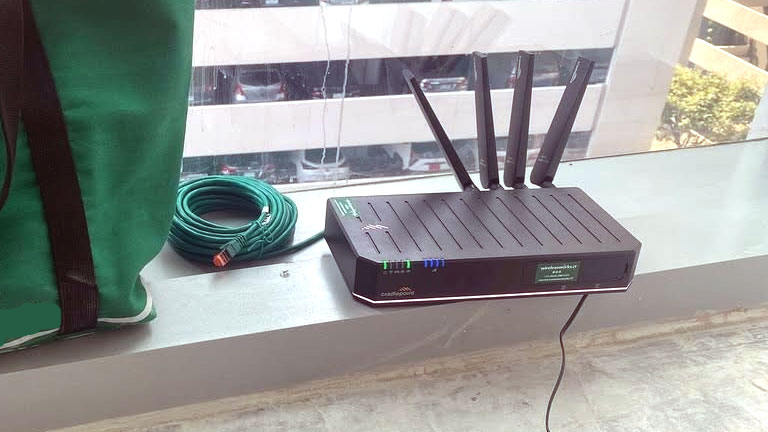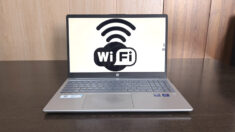
In today’s fast-paced digital age, internet connections have become mandatory for every business. You might be wondering what the best internet option is for your business. There are many types of internet options available. Fixed wireless can be a wise choice for your business among them because it provides fast and reliable internet without the need for cables.
What is fixed wireless internet?
Fixed wireless internet is a network connection in which internet signals are transmitted to your office or business location via airwaves (radio waves). This means that instead of using traditional cables, the signal is transmitted directly through towers and antennas to a receiver installed in your building. This connection is established at a fixed location, where internet service is limited to a single address. To set it up, you only need a small router and antenna.
The biggest advantage is that it eliminates the need for digging or laying cables. You connect directly to the airwave signal. This makes it a matter of hours to connect to a new location. Additionally, this service is less affected by weather changes than traditional cable or satellite.
The Role of Fixed Wireless in Business Connectivity
The Internet isn’t just a convenience for your business; it’s the foundation of daily operations. If your point-of-sale system, cloud server, or video conferencing system goes down, business could grind to a halt.
Fixed wireless can provide internet connectivity even when other options fail. For example, if your office is located outside the city or in the countryside where fiber or DSL isn’t available, fixed wireless can provide fast connectivity. You can be back online within hours after powering up the router, as if an unknown signal has connected directly to your network.
Advantages of Fixed Wireless
Installation is done in minutes by a technician because there is no need to lay cables. When opening a new office or moving to a different location, your internet can be set up in a matter of hours, saving you valuable time.
Fixed wireless is a dedicated link, so network speed fluctuations are minimal. The connection is not shared, so you get a fixed speed even during peak hours. Unlike underground cables, this connection is also protected from cuts and damage.
Fixed wireless connections with modern 4G/5G technology offer both very fast download and upload speeds. They can often reach gigabits compared to cable internet (cable/DSL). This means that large file transfers, high-definition video calls, and cloud applications run smoothly. Even when you are conducting video meetings or online presentations, the internet speed remains the same as if you had fiber.
Laying a new fiber network can take months and is quite expensive, while fixed wireless has a low initial cost. It only requires a few pieces of equipment, and the connection is up and running immediately, saving you both time and money.
Fixed wireless is especially useful if your business is opening a new office or branch. Simply install the router at the new location and the connection is ready in minutes. It doesn’t require complicated cabling, so you can install it yourself. As the number of employees or devices increases, network coverage can be expanded by installing additional antennas.
Fixed wireless is useful where traditional networks don’t reach. For example, 4G/5G towers provide high-speed internet even in mountainous terrain or remote rural areas.
For example, A construction materials factory is located in an industrial area far from the city. Laying a fiber line there would be expensive and take months. Fixed wireless internet can be helpful in such a situation. You installed an antenna and router on the factory roof, and within a few hours, the entire system was connected to the internet. Now, your order processing, stock management, and other services function without interruption.
When it rained and the city’s main fiber line was cut, your work continued because fixed wireless was active. This way, your operations continued smoothly. This example shows that business fixed wireless internet provides your business with a stable internet connection, regardless of any disruption.
Comparison with Other Internet Options
Fiber Optic Internet
Fiber connections offer faster internet, but require digging up underground and laying cables. This process takes months and is expensive. Fiber is not available in many places. In contrast, fixed wireless is readily available and can be easily set up anywhere.
Cable/DSL Internet
Cable/DSL internet is cheaper, but its bandwidth is shared among multiple users. When multiple people access the internet simultaneously, speeds drop. This doesn’t happen with fixed wireless because it’s your dedicated connection. You always get the promised speed.
Satellite Internet
Satellite internet is useful in remote areas, but it is affected by the weather. Its signal can be weak during rain or storms. It also has higher latency, which can interfere with video calls or gaming. Fixed wireless has fewer of these problems and generally provides a more stable connection.
Mobile broadband (hotspots)
Mobile data works anywhere, but isn’t as reliable for business. Many people connect to the same cell tower, which can lead to network congestion and speed drops. This doesn’t happen with fixed wireless because it is your dedicated connection. You get higher priority and no data limits, so your business applications can run smoothly.
Overall, fixed wireless internet provides your business with a fast, reliable, and flexible connection. It eliminates the hassle of laying long cables, and installation is done in minutes. When choosing a new location or to avoid network downtime, fixed wireless can be a great option. This type of internet offers fast deployment, flexibility for temporary needs, and cost savings by avoiding expensive physical infrastructure.


